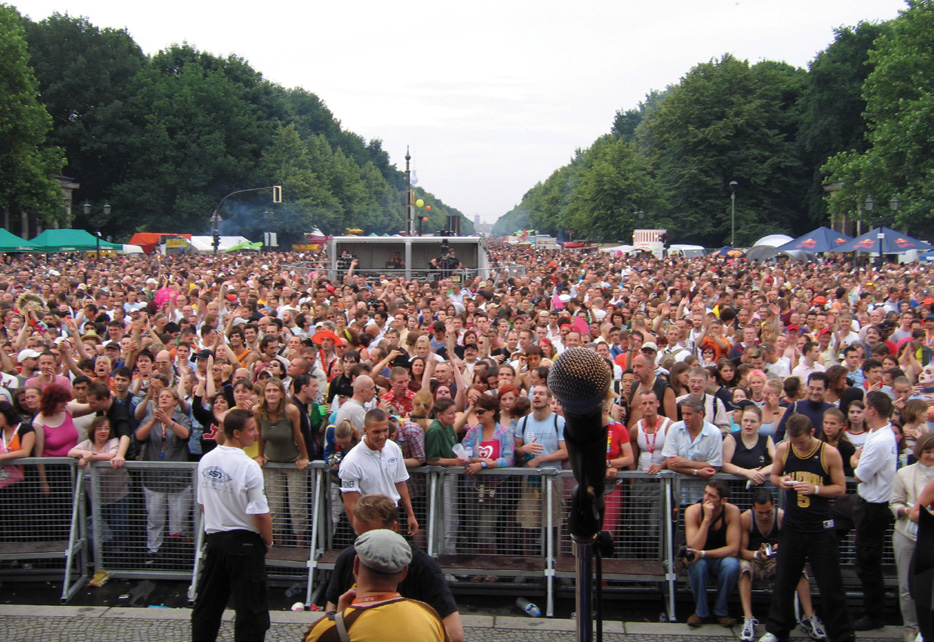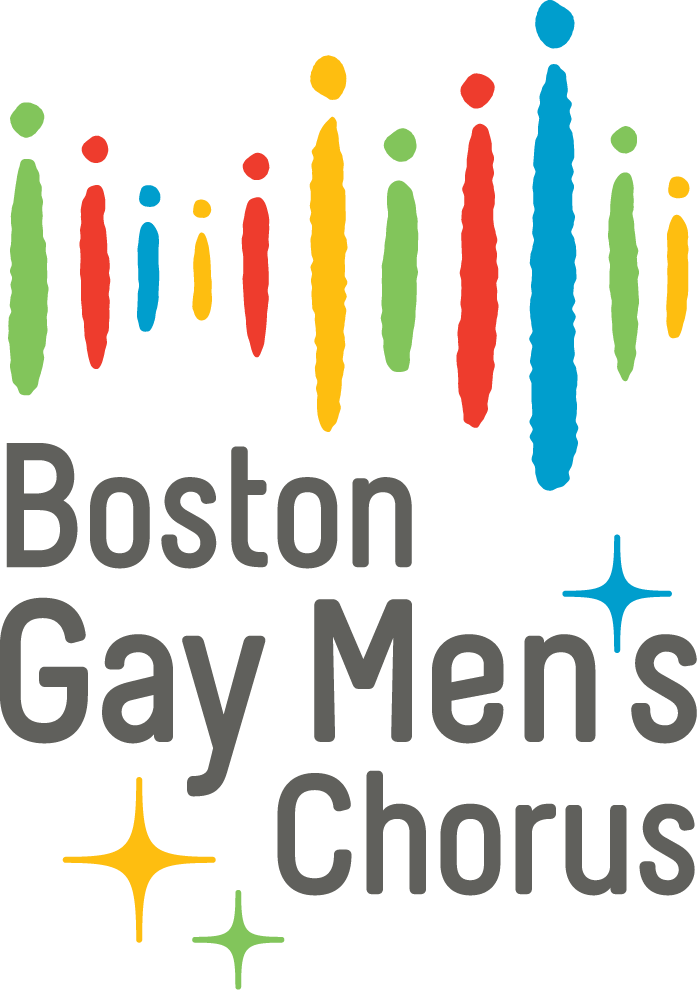The following year, we would once again make history in a big way. In the summer of 2005, the Boston Gay Men’s Chorus moved past our national boundaries and toured Europe. The first stop was Berlin. We had a joint concert with one of the gay men’s choruses there. The next day we participated in the Christopher Street Day parade. The Stonewall Inn, where the modern LGBTQ civil rights movement began, was located on Christopher Street, and many places around the world still name their pride festivities after it.

The parade route was miles long, and we were unable to march the entire route because we were one of the performing groups singing for the crowds at the Sieggessäule. The crowd was immense (between 700,000 and 900,000 depending on the source). As we took to the stage, the crowd stretched as far as the eye could see up the mile-long road to the Brandenburg Gate. We performed several songs, but the most impactful was The Day After That from Kiss of the Spider Woman.
Someday we’ll be free, I promise you we’ll be free
If not tomorrow, then the day after that.
And the candles in our hands will illuminate this land
If not tomorrow, then the day after that.
And the world that gives us pain, and lives our lives with fear,
On the day after that, will disappear.
And the war we’ve fought to win, I promise you we will win.
If not tomorrow, then the day after that, or the day after that,
or the day after that, or the day after that.
The crowd was in tears, the chorus was in tears, there was not a dry eye to be seen anywhere. The Berlin Wall had fallen only fifteen years earlier, and many of the LGBTQ people in the audience had grown up under communist rule. As we left for Poland the next day, we little knew what lay in store for us.
Wroclaw is the third-largest city in Poland, a very Catholic nation and home of Pope John Paul II. We arrived there in the late afternoon and went to dinner on our own. Upon returning to the hotel, it was clear that there were police vans at either end of the driveway. There had been threats against us. The next day, instead of walking to the venue just blocks away, we were transported by bus, with armed policeman escorting us. We arrived to see police with semi-automatic rifles guarding our way, and more in the parking lot next door to support them if necessary. Sales of tickets were temporarily suspended as the protestors threatened to purchase them all to disrupt the performance.
After rehearsal, we were not allowed to leave the building. We found our way upstairs to a small snack bar, eating cakes and drinking tea while watching things unfold through the windows. A small group of anti-gay protestors were out front holding banners and chanting. Then we heard a loud noise and saw dozens more marching up the sidewalk to join them. A kind Polish woman who spoke English from the snack bar pointed to the initial group saying “Those people they do not like you so much.” Even without speaking Polish, we figured that out from the vulgar symbols on the signs they held. She then pointed to the other group and said “Those people over there, they say that there is no room for hate in Poland. It is a lesson we have learned all too well. Everyone should be welcome here.”
Organized by a political group, Demokracie, we ended up giving tickets to the group to come in and hear us sing. When the concert started with the Polish hymn Gauder Mater Polonia, there was not a dry eye in the audience. The tour ended with a concert in Prague to raise funds for equal marriage in the Czech Republic, but after Berlin and Poland it was slightly anticlimactic. The concerts were recorded live, and we released a CD of the music, Live in Poland, later that year. The orange color of the cover is a tribute to the Demokracie protestors, as it was their color.
Our spring 2006 concert was Metamorphosis. Joining us in this concert were the women of Boston women’s chorus Voices Rising. The show benefited Parents, Families, and Friends of Lesbians and Gays (PFLAG) and the Gay, Lesbian, Straight Educators Network (GLSEN). The title and central piece, Metamorphosis, was commissioned and originally performed by the Twin Cities Gay Men’s Chorus, it tells the story of a gay man from birth through childhood to adulthood. Some of Michelle’s students from the Conservatory joined as a dance troupe. Metamorphosis has eleven movements. The finale, I Can Fly, celebrates with “no regrets, no goodbyes, finally I can fly” as the lead dancer “flew” up into the chorus, carried on their hands.
The following year, the chorus hit a major milestone: a quarter century of singing, dancing, and changing the world. In honor of this milestone, the anniversary concert returned the chorus to where our story began: the newly renovated Opera House. Joining us for this celebration was the noted Broadway singer Linda Eder. When Linda heard our Gershwin CD, Here to Stay, she agreed to sing with us.
Linda was one of the nicest and most charming guest artists we have performed with. She was late to rehearsal because she missed her train. Upon arriving, she apologized and told us the story of trying to navigate with the new GPS system she had been given, which ended with her getting stuck behind a truck and pulling into the parking lot just as the train was pulling out of the station. The concert went well, and she was, of course, well-received by the audience as she performed. The program called for the concert to end with us singing three songs together: Don’t Rain on My Parade, Anthem, and I Am What I Am.
After the final song, she spoke with the audience a bit more about what a pleasure it was to work with us, and how much she appreciated our singing. She then said that she wanted to do one more song with us. This was news to Reuben and the chorus, as no encore had been planned. She turned to us, pulled the microphone away, and said “Just follow me boys.” She then broke into Somewhere Over the Rainbow, which she had heard on our Oz and Beyond CD. As we sang whatever note in the chord came to us, we produced a beautiful rendition of the song. Linda cut us off just before the end and belted the rest out solo in her beautiful voice. It was, without a doubt, one of the most amazing impromptu performances the chorus has ever done. After the curtain closed Linda remained by the stage door and gave hugs and thank yous to every member of the chorus as they went by. Truly a class act.
Our spring concert in 2008 saw us return to Symphony Hall for Words & Music, a concert about civil liberties and freedom of expression. Reuben told us about learning from his mother in childhood to study history because “it is only in our past that we find our future.” Another pleasure of this concert was the return of Ellen Oak as guest conductor. The music included Legacy (from Metamorphosis), Gwyneth Walker’s The Tree of Peace, Michael’s Letter to Mama, and three of George Michael’s songs: Faith, A Different Corner, and Freedom 90. The second act was the premier of A Whitman Oratorio, commissioned specifically for the BGMC. Reuben concluded his program message with “If history teaches us anything, it teaches us how easy it is to become complacent, to let someone else speak for us. I hope that tonight our music inspires you to sing and to dance, to laugh and to cry, but most of all, to go out and make your voice heard!”
The first decade of the twenty-first century was a rollercoaster up-and-down ride of highs and lows. From performing in Carnegie Hall to the tragedy of 9/11 in just a matter of months. Winning our hard-fought battle to become the first state in the union to win equal marriage. The European tour where we stood up to threats and became the first openly gay group to perform in Poland. And celebrating our milestone 25th anniversary. Membership continued to grow, with 219 members on the rolls in December 2009. During our first decades we had grown from a group effecting change locally and nationally. Now we were making an impact internationally.
